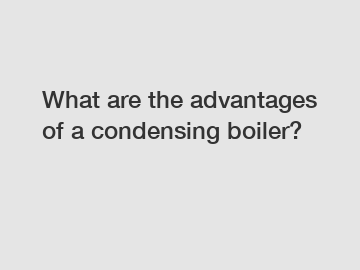What are the advantages of a condensing boiler?
Condensing boilers have gained immense popularity in recent years due to their energy efficiency and cost-saving advantages. These boilers are designed to effectively utilize heat energy from the exhaust gases by condensing the water vapor present in them. By doing so, they maximize fuel efficiency and reduce greenhouse gas emissions. Let's delve into the various advantages of condensing boilers:
1. Energy Efficiency: One of the primary benefits of a condensing boiler is its exceptional energy efficiency. Traditional non-condensing boilers waste a significant amount of heat through the flue gases, whereas condensing boilers recover much of this heat by condensing the water vapor contained in the exhaust. This heat recovery process increases the boiler's efficiency, allowing it to extract more usable heat from the same amount of fuel. As a result, condensing boilers can achieve efficiencies of up to 98%, compared to the 70-80% efficiency of non-condensing boilers.

2. Reduced Energy Bills: With their higher efficiency, condensing boilers can significantly reduce energy consumption and, consequently, lower energy bills. By maximizing heat recovery, these boilers utilize fuel more effectively, requiring less energy to produce the desired level of heat output. This increased efficiency translates into tangible savings for homeowners and businesses, making condensing boilers a cost-effective investment in the long run.
3. Environmental Benefits: Another advantage of condensing boilers is their environmentally friendly nature. The reduced fuel consumption and lower emissions associated with these boilers have a positive impact on the environment. The primary reason for this is the lower carbon dioxide (CO2) emissions resulting from the higher efficiency and lower fuel usage. By switching to a condensing boiler, individuals and organizations can contribute to reducing their carbon footprint and combatting climate change.
4. Increased Heat Output: Condensing boilers provide a higher heat output compared to non-condensing boilers of the same size. The reason behind this is the additional heat that is extracted from the flue gases during the condensation process. With their improved heat transfer capabilities, condensing boilers can deliver a larger amount of heat to meet heating demands, making them particularly suitable for larger homes or commercial buildings.
5. Flexibility in Installation Options: Condensing boilers can be installed in various configurations, providing greater flexibility for homeowners and businesses. These boilers are compatible with both radiator-based central heating and underfloor heating systems, allowing users to choose the option that best suits their preferences and requirements. Moreover, condensing boilers do not require a chimney for ventilation, enabling more freedom in positioning the boiler and enhancing the overall aesthetics of the surroundings.
In conclusion, condensing boilers offer numerous advantages that make them a superior choice over traditional non-condensing boilers. Their exceptional energy efficiency, resulting in reduced energy bills, and lower environmental impact are key factors that make them an attractive option for both residential and commercial settings. The increased heat output and flexibility in installation options further enhance their appeal. By harnessing the benefits of condensing boilers, individuals and organizations can not only save money but also contribute to a more sustainable future. So, consider switching to a condensing boiler and reap the rewards it brings to both your pocket and the environment.
For more information, please visit Exhaust Gas Steam Boiler, 120KW Condensing Boiler, Best Waste Heat Boilers.



Comments
Please Join Us to post.
0